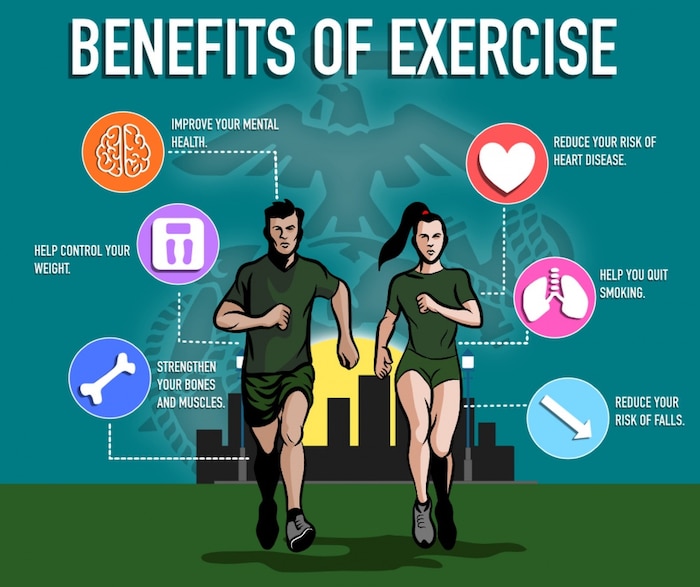As humans, we are designed to move. Our bodies require physical activity to function optimally. Exercise plays a crucial role in maintaining good health and well-being. Regular exercise can help prevent chronic diseases, manage weight, improve mental health, and enhance quality of life. In this article, we will explore the importance of exercise for overall health.
Exercise and Chronic Diseases
Chronic diseases such as heart disease, stroke, diabetes, and cancer are the leading causes of death worldwide. Regular exercise can help prevent these diseases and improve outcomes for those who have them.
Exercise is essential for heart health. Regular aerobic exercise can improve cardiovascular health by reducing blood pressure, lowering LDL cholesterol levels, and improving circulation. Exercise also improves the heart's ability to pump blood, making it more efficient and reducing the risk of heart failure.
Regular exercise can also help prevent stroke. Exercise can lower blood pressure, reduce the risk of blood clots, and improve circulation. These factors can help reduce the risk of stroke and improve outcomes for those who have had a stroke.
Type 2 diabetes is a growing health concern worldwide. Regular exercise can help prevent type 2 diabetes by improving insulin sensitivity and glucose uptake. Exercise can also help manage blood sugar levels in those who have diabetes, reducing the risk of complications.
Cancer is another leading cause of death worldwide. Regular exercise can help reduce the risk of certain types of cancer, including breast, colon, and lung cancer. Exercise can also improve outcomes for those who have cancer by reducing the risk of recurrence and improving quality of life.
Exercise and Weight Management
Exercise plays a crucial role in weight management. Regular exercise can help burn calories and increase metabolism, leading to weight loss or weight maintenance.
To lose weight, a calorie deficit must be created, meaning more calories must be burned than consumed. Exercise can help create this deficit by burning calories during and after exercise. High-intensity exercise, such as interval training or weightlifting, can also increase metabolism, leading to more calories burned at rest.
Exercise can also help maintain weight loss by preventing weight regain. Regular exercise can help increase muscle mass, which can increase metabolism and burn more calories at rest. Exercise can also help control appetite and reduce the risk of overeating.
Exercise and Mental Health
Exercise is not just beneficial for physical health, but also mental health. Regular exercise can help improve mood, reduce stress and anxiety, and improve cognitive function.
Exercise can help improve mood by increasing the release of endorphins, which are natural mood-boosting chemicals in the brain. Exercise can also reduce stress and anxiety by reducing levels of cortisol, the stress hormone.
Regular exercise can also improve cognitive function by increasing blood flow to the brain and improving the formation of new neural connections. Exercise can also improve memory and reduce the risk of cognitive decline.
Exercise and Quality of Life
Exercise can enhance quality of life in many ways. Regular exercise can improve physical function, reduce the risk of falls and injuries, and increase independence.
Exercise can improve physical function by increasing strength, flexibility, and balance. This can help reduce the risk of falls and injuries, which can have a significant impact on quality of life.
Regular exercise can also increase independence by improving the ability to perform daily activities, such as getting dressed or cooking meals. Exercise can also improve social connections by providing opportunities to participate in group activities or team sports.
How Much Exercise Do You Need?
The benefits of exercise are clear, but how much exercise do you need to reap these benefits? The World Health Organization recommends at least 150 minutes of moderate-intensity aerobic exercise or 75 minutes of vigorous-intensity aerobic exercise per week. This can be achieved through activities such as brisk walking, cycling, or swimming
In addition to aerobic exercise, the WHO also recommends muscle-strengthening activities at least twice a week. These activities can include weightlifting, push-ups, or yoga.
It's essential to find an exercise routine that is enjoyable and sustainable. Exercise should be a part of daily life, not just a temporary solution. Finding activities that are enjoyable, such as dancing or hiking, can help make exercise a regular habit.
How to Start Exercising
Starting an exercise routine can be daunting, but it doesn't have to be. Here are some tips for starting an exercise routine:
- Start small: It's essential to start with small, achievable goals to build confidence and momentum. Begin with 10-15 minutes of exercise per day and gradually increase the duration and intensity.
- Find an enjoyable activity: Exercise doesn't have to be boring or tedious. Find activities that are enjoyable, such as dancing, hiking, or swimming.
- Make it a habit: Exercise should be a regular part of daily life. Set a schedule for exercise and make it a priority.
- Get a support system: Having a support system can help maintain motivation and accountability. Join a group fitness class or find a workout partner.
- Consult a healthcare professional: Before starting an exercise routine, consult a healthcare professional to ensure safety and appropriate exercise recommendations.
Conclusion
Exercise is a critical component of overall health and well-being. Regular exercise can help prevent chronic diseases, manage weight, improve mental health, and enhance quality of life. The benefits of exercise can be achieved through activities such as brisk walking, weightlifting, or yoga. Starting an exercise routine can be intimidating, but with small goals and a support system, it can become a regular part of daily life. Consult a healthcare professional before starting an exercise routine to ensure safety and appropriate exercise recommendations.
FAQ
- What are the benefits of regular exercise?
Regular exercise can help prevent chronic diseases, manage weight, improve mental health, and enhance quality of life.
- How much exercise do I need?
The World Health Organization recommends at least 150 minutes of moderate-intensity aerobic exercise or 75 minutes of vigorous-intensity aerobic exercise per week, in addition to muscle-strengthening activities at least twice a week.
- What are some enjoyable exercise activities?
There are many enjoyable exercise activities, including dancing, hiking, swimming, yoga, or team sports.
- How can I start an exercise routine?
Start with small, achievable goals and find an enjoyable activity. Make exercise a habit and get a support system. Consult a healthcare professional before starting an exercise routine.
- Can exercise improve mental health?
Yes, regular exercise can help improve mood, reduce stress and anxiety, and improve cognitive function.
- Can exercise help with weight loss?
Yes, regular exercise can help with weight loss by burning calories and increasing metabolism.
- Can exercise help with cardiovascular health?
Yes, exercise can help improve cardiovascular health by strengthening the heart and reducing the risk of heart disease.
- Can exercise improve immune function?
Yes, regular exercise can improve immune function by increasing circulation and activating immune cells.
- Can exercise improve sleep?
Yes, exercise can improve sleep by reducing stress and anxiety and promoting relaxation.
- Can exercise reduce the risk of certain cancers?
Yes, regular exercise can reduce the risk of certain cancers, such as breast, colon, and lung cancer.
- Can exercise improve bone health?
Yes, exercise can improve bone health by increasing bone density and reducing the risk of osteoporosis.
- Can exercise improve balance and flexibility?
Yes, regular exercise can improve balance and flexibility, reducing the risk of falls and injuries.
- Can exercise reduce the risk of stroke?
Yes, exercise can reduce the risk of stroke by improving cardiovascular health and reducing hypertension.
- Can exercise improve cognitive function?
Yes, regular exercise can improve cognitive function by promoting brain plasticity and increasing blood flow to the brain.
- Can exercise reduce the risk of type 2 diabetes?
Yes, regular exercise can reduce the risk of type 2 diabetes by improving insulin sensitivity and glucose regulation.
- Can exercise improve digestion?
Yes, exercise can improve digestion by increasing gut motility and reducing constipation.
- Can exercise reduce the risk of depression?
Yes, regular exercise can reduce the risk of depression by promoting the release of endorphins and reducing stress and anxiety.
- Can exercise improve overall quality of life?
Yes, regular exercise can improve overall quality of life by enhancing physical health, mental health, and social connectedness.
- Can exercise be harmful?
While exercise is generally safe and beneficial, excessive exercise or improper form can lead to injury or other negative outcomes.
- Can anyone exercise?
Most people can exercise safely, but it's important to consult a healthcare professional before starting an exercise routine, especially if you have any underlying health conditions or concerns.




